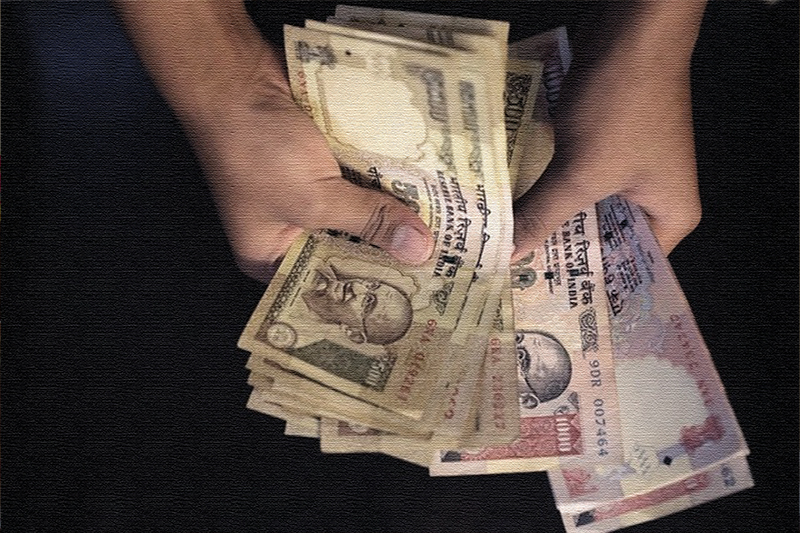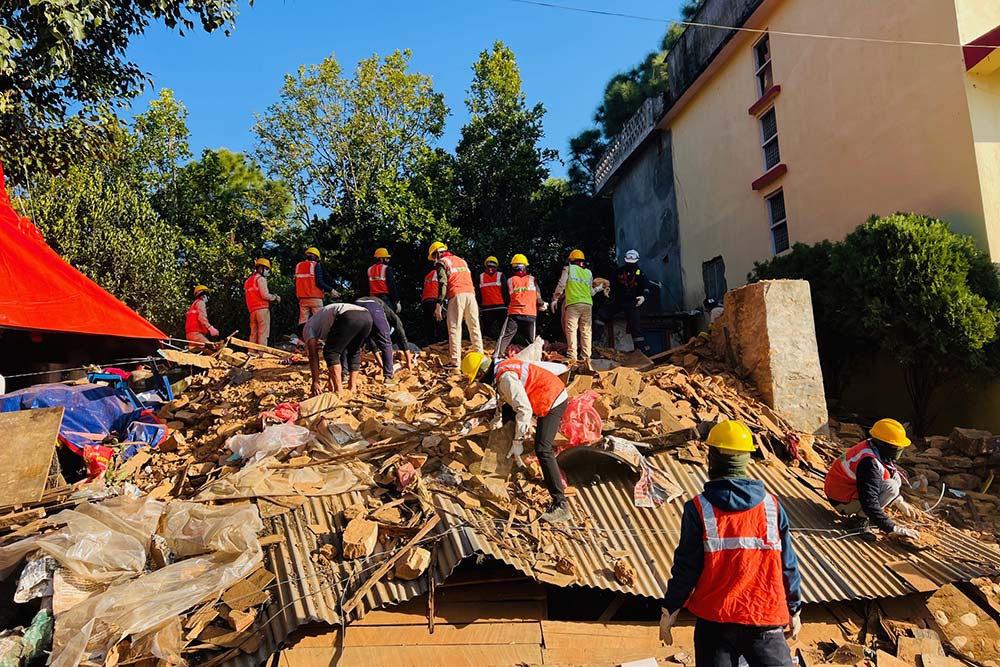
It did not take even a minute for Nepali citizens to get affected after the Indian government on November 8 demonitised INR 500 and 1,000 notes. The Modi led government’s move to crack the whip on parallel economy threatened especially those businessmen in Nepal who have been conducting cross-border trade and business with Indian counter parts in hard cash. Further affected were those in the illegal exchange trade (hundi), casinos, and people who hoarded Indian currency for various purposes.
Nepal’s Rastra Bank is unable yet to clearly state how the money that had suddenly become paper could be exchanged.
Indian currency is widely accepted in Nepal and Bhutan. Following the Indian government‘s decision, NRB has banned sale or exchange of INR 500 and INR 1,000 notes in the country. Reserve Bank of India (RBI) is yet to provide guidelines on how the Indian currency in Nepal will be exchanged. In response to RBI, Nepal has indicated that INR 33.69 million is in circulation within banking channels. NRB Governor Dr Chiranjibi Nepal has explained that NRB cannot do anything with the banned denominations that is in public possession until the Indian government allows Nepal to surrender currency circulated in Nepal.
The Federation of Nepalese Chambers of Commerce and Industry (FNCCI) estimate that there is as much as INR 10 billion of the two denominations in possession within the country. A delegate from the apex business body also met with Prime Minister Pushpa Kamal Dahal immediately after the ban and requested to settle the issue at the Prime Ministerial level as early as possible citing that traders in the border area are suffering from this move. “Traders, families of migrant workers, students, those frequently travelling to India for health check ups and for other reasons, hoteliers, money exchange, shopping centres holding Indian currencies in the banned denominations in substant amounts are restless and want this issue to be resolved at the earliest,” says Pashupati Murarka, President of FNCCI.
Ban of high denomination Indian bank notes directly hit traders of the border area with trading activities affected badly. The Indian government allows Nepali or Indian Nationals visiting Nepal from India to carry up to INR 25,000. Ashok Temani, former President of Birgunj Chamber of Commerce and Industries (BCCI) said that besides the obvious impact, even trucks ferrying Nepal bound cargo from Kolkata to Nepal were stranded at the various points. Export cargo remained stranded at various checkpoints after the ban because traders do not have Indian currency to pay the fare of truck and lorries. “Big transactions are carried out through draft and telegraphic transfers but cash in hand is essential for day-to-day work and smaller transactions,” Temani asserted.
Harsha Shahani CEO, VChitra
Demonetisation is a very positive step for India, however it will have short term negative and an immediate impact in Nepal as Indian currency was a legal tender here.
Tourism from India will be hit as Nepal depends on Indian tourists who brought in the big bills as they were easier to carry. Although Indian cards are accepted here, not many in Nepal prefer card payments. But this could force Nepal’s tourism industry to switch to digital cash/card transactions which could be a silver lining for the industry.
However, the biggest hit will be on small traders on border towns who did daily cash transactions across the border. I feel they will bear the maximum brunt as most of their purchases are in cash.
To make matters worse Nepal has stopped the use of the new replacement bills until India issues a FEMA notification, as per the Foreign Exchange Management Act. This we will see a drop in business in Terai belt bordering India.
Also migrant Nepali workers holding on to their earnings in big notes will be affected too. Unlike Indians, Nepalese citizens are not able to exchange or deposit their notes by the December 30 deadline set by New Delhi’s transition plan.
Collection of agro products that are exported to India like large cardamom and fresh vegetables has completely stopped after the ban and district chambers of eastern Nepal have been requesting the government and FNCCI to sort out the issue as early as possible, shared Pashupati Murarka, President of FNCCI. The flow of Indian tourists via land has also been affected largely due to the cash crunch in India.
Within India, news reports show an economic slowdown and huge lines of panic stricken citizens at ATMs and banks. FNCCI has pointed out that Nepal Rastra Bank has completely failed to address this issue. However, Central Bank states the contrary with Dr Nepal saying, “We have written to the Ministry of Finance and Ministry of Foreign Affairs to talk with their counterpart ministries so that the Indian government can take early decision to provide exchange facility in Nepal. The ministries have started diplomatic initiatives for the same”.
NRB, in close coordination with Embassy of India in Kathmandu, also started ground works to address the concern of the Indian government that exchange facility given to Nepal will not be misused, Governor Nepal further explained. The government has formed a committee under the convenorship of NRB Deputy Governor Chintamani Shiwakoti comprising of Joint Secretary of the Financial Sector Management Division under the Ministry of Finance Ananda Raj Dhakal, Executive Directors from Nepal Rastra Bank— Bhisma Raj Dhungana (Foreign Exchange Management Department) and Janak Bahdur Adhikari (NRB Banking Office), Presidents of Nepal Bankers Association and Development Bankers Association Anil Keshary Shah and Krishna Raj Lamichhane to prepare a modality on how the Indian bank notes can be exchanged effectively. The committee has been working on plugging all the loopholes of potential flow of illicit money.

Akash Shrestha Researcher, Samriddhi Foundation
istinction between the impact of demonitisation on individual Nepalese and the economy as a whole. Again, under individuals, there will be different groups – big businessmen, people/families living in the bordering region or people from the mid and far western hills that work in India. I think the latter category of people are the ones to be most affected.
These are families that depend on their wage stationed in India. They are low-skilled workers who do not have bank accounts and therefore depend on cash to support their families. And whatever reserve they have at the moment has pretty much become worthless pieces of paper. And with even employers being unable to pay them, they will greatly suffer.
Talking about Nepal, the hopeful scenario will be that the massive reduction in money supply promises to bring - as economics tells us - prices of goods and services down as little money is chasing more goods. That would mean that price levels in Nepal will also come down as we borrow India’s prices. But that does not quite tell the entire story. We might have to dig a little deeper. People generally evade taxes and hoard black money when taxes are unfairly high. Nobody wants to pay any more to the government than the value they see in services that government offers in return. Without addressing these issues, you cannot expect demonetisation to solve all of India’s problems with black money. In fact this will only trigger more capital flight, the rich who lose a substantial chunk of their property will cut down on consumption, and employers will lay-off more employees. This again will only add fuel to fire. Remember how the gulf countries cutting down on consumption and laying off foreign workers is hurting Nepal?
“We have developed a form in which the depositor must mention source of income, three generation details of the depositer, numbers of every single INR 500 and INR 1000 deposited in the bank, and also declare in the form that s/he is ready to be penalized under Foreign Exchange Regulation Act if the details found are incorrect or the person found submitting the application for exchange facility in more than one bank or financial institution,” shared a member of this committee.
Some Indian media reports have indicated that the Indian government has also formed a inter ministry/agency committee to finalise the modality. The committee comprises of officials from the Ministry of External Affairs, Finance Ministry and RBI officials.
Though there has not been any concrete decision yet from the Indian government, Deputy Prime Minister and Finance Minister Krishna Bahadur Mahara has said that India must provide opportunity to surrender high denomination Indian bank notes because as it is in wide circulation here. “Our government has been talking with the Government of India and they are positive towards providing exchange facility but want to be assured on how effectively the country will be able to plug loopholes to prevent flow of ‘black money’ from India to Nepal,” Mahara said. He further said that this incident provides a lesson to Nepalis to use their own currency.






